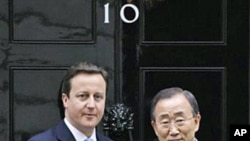As rival groups clashed in Egypt’s capital Wednesday, U.N. Secretary General Ban Ki-moon called violence against peaceful protesters "unacceptable" Mr. Ban spoke alongside Britain’s Prime Minister in London as they called for speedy political reform.
Mr. Ban spoke Wednesday in London:
"I am deeply concerned at the continuing violence in Egypt," said Ban Ki-moon. "I once again urge restraint to all the sides. An unacceptable situation is happening. Any attack against the peaceful demonstrators is unacceptable and I strongly condemn it."
Supporters of Egyptian President Hosni Mubarak clashed Wednesday with those who want the long-time leader to step down right away.
Mr. Mubarak said Tuesday that he will leave in September when his term ends. But many protesters who have rallied in Egypt for over a week say that is not soon enough.
Standing beside Mr. Ban in London was British Prime Minister David Cameron, who said the clashes on Cairo’s streets show there can be no delay on political reform.
"They underline the need for political reform and frankly for that political reform to be accelerated and happen quickly," said David Cameron. "We need to see a clear road map for that political reform so that people in Egypt can have confidence that their aspirations for a more democratic future with greater rights is met."
Mr. Cameron is one of a number of international leaders who have called for the transition of power to start immediately.
French President Nicolas Sarkozy called for political transition to start without delay and a spokesperson for the German government said it hopes for a "speedy transition".
They have not made an outright call for Mr. Mubarak to step down.
Middle East and North Africa analyst with the London-based research group Chatham House, Nadim Shehadi says European leaders, like many around the world, are worried about the stability of Egypt - long an important ally of many western governments.
"If you look at Iraq now compared to Egypt, Iraq looks much more stable because at least in Iraq you know there is a crisis, you know what the factors are, you know there is a process to resolve it: the risks are more or less known," said Nadim Shehadi. "Whereas in Egypt, two weeks ago - barely two weeks ago - you would have thought that Egypt was the most stable country in the region."
The European Union has close ties to Egypt through a partnership that spans the Mediterranean and aims to promote prosperity and stability in the region.
A spokesperson for the European Commission said the E.U. executive branch is ready to step up its assistance to Egypt.
Shehadi says Europe has itself gone through major transitions in recent decades and it has the tools and experience to help Egypt move forward.
"Europe is in going to be in a strong position because of the experience and the knowhow and because assistance from Europe is more acceptable and less controversial than assistance from the United States," he said.
EU leaders are expected to debate the implications of recent demonstrations across North Africa during a meeting Friday in Brussels.
Ban Ki-moon Condemns Egypt Violence




